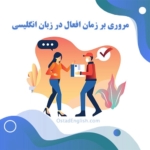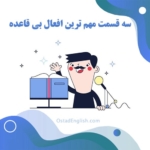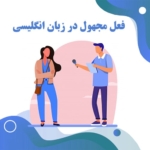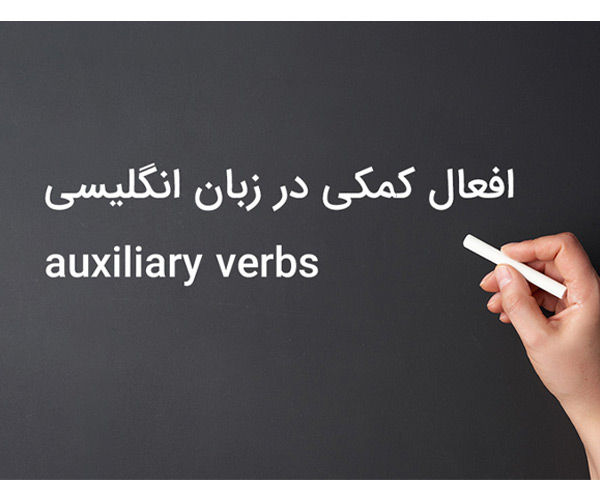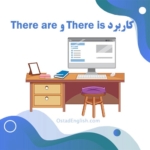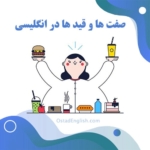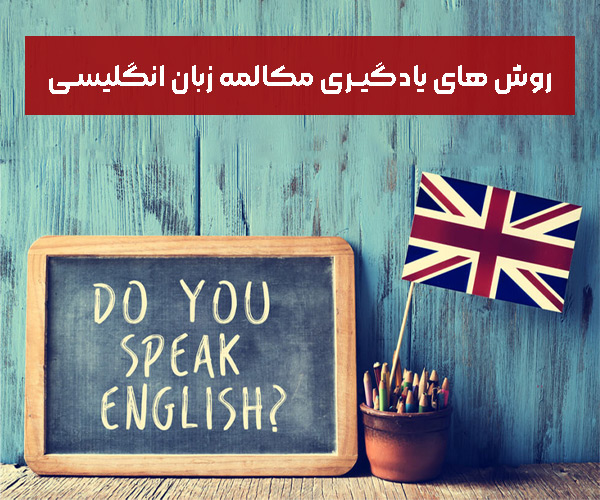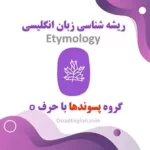در این مقاله به آموزش افعال کمکی منفی و سوالی در بخش گرامر انگلیسی میپردازیم:
Auxiliary Verbs Negative
افعال کمکی انگلیسی شکل منفی
شکل مثبت
افعال کمکی مانند must، can ، may و should همراه با شکل ساده فعل به کار می روند.
شکل ساده فعل + should/can/must/may + فاعل
She may/ must/ can/ should speak English.
او ممکن است / باید/ می تواند / خوب است انگلیسی صحبت کند.
شکل منفی
برای منفی کردن افعال کمکی not بعد از آنها اضافه می شود.
شکل ساده فعل + not + may/ must/ can/ should + فاعل
She may/ must/ can/ should not speak English.
او ممکن نیست/ نباید/ نمی تواند/ خوب انگلیسی صحبت کند.

نکته: شکل کوتاه شده منفی
شکل ساده فعل + may not/ mustn’t/ can’t/ shouldn’t + فاعل
May شکل کوتاه شده ندارد.
(۱)Practice
Change the following sentences from affirmative to negative.Use both the full form and the contracted form (except for may.)
تمرین شماره ۱ از افعال کمکی منفی :
جملات را از مثبت به منفی تبدیل کنید. از دو شکل کامل و کوتاه شده استفاده نمایید.(غیر از may)
۱) we can meet you later.
(we cannot meet you later.we can’t meet you later.)
۱)ما می توانیم شما را بعدا ببینیم. (ما نمی توانیم شما را بعدا ببینیم.)
۲) you may sit here.
۲) شما اجازه دارید در اینجا بنشینید.
پاسخ: (you may not sit here)
۳) we should tell her about it.
۳) ما باید این موضوع را به او بگوییم.
پاسخ:(we should not/shouldn’t tell her about it)
۴) he may leave on Wednesday.
۴) او ممکن است روز چهارشنبه حرکت کند.
پاسخ:(he may not leave on Wednesday)
۵) they can go by plane.
۵) آنها می توانند با هواپیما بروند.
پاسخ:(they can not / can’t go by plane)
۶) we must wait here.
۶) ما باید در اینجا منتظر بمانیم.
پاسخ:(we must not/ mustn’t wait here)
۷) I can understand him easily.
۷) منمی توانم منظور او را به راحتی درک کنم.
پاسخ:(I cannot/can’t understand him easily)
۸) she should sit near the window.
۸) او بهتر است نزدیک پنجره بنشیند.
پاسخ: (she should not/shouldn’t sit near the window)
۹) we must do the same thing again.
۹) ما باید همان کار را دوباره انجام دهیم.
پاسخ:(we must not/ mustn’t do the same thing again)
۱۰) she can play the piano well.
۱۰) او می تواند به خوبی پیانو بنوازد.
پاسخ:(she cannot/ can’t play the piano well)
۱۱) he can understand everything I say.
۱۱) او می تواند هر چیزی را که من می گویم بفهمد.
پاسخ:(he cannot/can’t understand everything I say)
۱۲) you should watch television every night.
۱۲) شما خوب است هر شب تلویزیون تماشا کنید.
پاسخ:(you should not/shouldn’t watch television every night)
۱۳) she may pass her examination.
۱۳) او امکان دارد در امتحانش قبول شود.
پاسخ:(she may not pass her examination)
۱۴) you can see him later.
۱۴) شما می توانید بعدا او را ببینید.
پاسخ:(you cannot/can’t see him later)
۱۵) you may smoke here.
۱۵) شما اجازه دارید در اینجا سیگار بکشید.
پاسخ:(you may not smoke here)
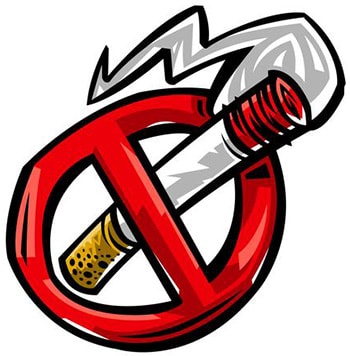
Auxiliary Verbs Questions
افعال کمکی شکل سوالی
May / must / can/ should she speak English?
آیا او ممکن است / باید/ می تواند / خوب است انگلیسی صحبت کند؟
Can you speak English?
آیا شما می توانید انگلیسی صحبت کنید؟
Must she read the book?
آیا او باید کتاب را بخواند؟
May I leave the class?
آیا من اجازه دارم کلاس را ترک کنم؟
Should we see a doctor?
آیا ما باید به یک دکتر مراجعه کنیم؟
(۲)Practice
Change the following statements to questions.
تمرین شماره ۲ از افعال کمکی سوالی :
جملات خبری زیر را به سوالی تبدیل کنید.
۱) they should obey rules.
(should they obey rules?)
۱) آنها باید از قوانین اطاعت کنند.
(آیا آنها باید از قوانین اطاعت کنند؟)
۲) they both can speak English well.
۲) آن ها هر دو می توانند به خوبی انگلیسی صحبت کنند.
پاسخ: (?can they both speak English well)
۳) Betsy should spend more time on her English.
۳) بستی باید وقت بیشتری را صرف انگلیسی اش کند.
پاسخ: (?should Betsy spend more time on her English)
۴) we may sit in these chairs.
۴) ما اجازه داریم روی این صندلی ها بنشینیم.
پاسخ: (?may we sit in these chairs)
۵) they can meet us at two o’clock.
۵) آنها می توانند در ساعت دو ما را ببینند.
پاسخ:(?can they meet us at two o’clock)
۶) I may call you later.
۶) من ممکن است بعدا به شما زنگ بزنم.
پاسخ:(?may I call you later)
۷) he should eat less meat.
۷) او بهتر است کمتر گوشت بخورد.
پاسخ:(?should he eat less meat)
۸) he may tell her.
۸) او ممکن است با او صحبت کند.
پاسخ:(?may he tell her)
۹) we should speak to her about it.
۹) ما باید در این باره با او صحبت کنیم.
پاسخ: (?should we speak to her about it)
۱۰) they may leave now.
۱۰) انها ممکن است حالا بروند.
پاسخ: (?may they leave now)
۱۱) you could go by plane.
۱۱) شما می توانستید با هواپیما بروید.
پاسخ: (?could you go by plane)
۱۲) you could send them a cable.
۱۲) شما می توانستید یک تلگراف برایشان بفرستید.
پاسخ: (?could you send them a cable)
۱۳) I should stay at home more.
۱۳) من باید بیشتر در خانه بمانم.
پاسخ: (?should I stay at home more)
۱۴) Allan may wait in his office.
۱۴) الن ممکن است در دفترش منتظر بماند.
پاسخ: (?may Allan wait in his office)
۱۵) Al can go with us to the beach.
۱۵) ال می تواند با ما به ساحل برود.
پاسخ: (?can Al go with us to the beach)
۱۶) she could leave immediately.
۱۶) او می توانست فورا برود.
پاسخ: (?could she leave immediately)
Auxiliary Verbs Question with question words
افعال کمکی (سوالی با کلمات پرسشی)
مفعول | شکل ساده فعل | فاعل | فعل کمکی | کلمه پرسشی |
must may can should | when where what how why | |||
home? | go | they | should | when |
They should go home now.
آنها حالا باید به خانه بروند.
Should they go home now?
آیا انها حالا باید به خانه بروند؟
When should they go home?
آنها چه موقع باید به خانه بروند؟
He must be in Chicago.
او باید در شیکاگو باشد.
Must he be in Chicago?
آیا او باید در شیکاگو باشد؟
Where must he be?
او باید در کجا باشد؟
(۳)Practice
Change the following sentences to questions beginning with the question words in parentheses.
تمرین شماره ۳ از افعال کمکی سوالی با کلمات پرسشی:
جملات زیر را با کلمات پرسشی داخل پرانتز سوالی کنید.
۱) He can see her later.(when)
(when can he see her?)
۱) او بعدا می تواند او را ببیند.(چه موقع)
(او چه موقعی می تواند او را ببیند؟)
۲) the baby-sitter could wait here.(where)
۲) پرستار بچه می توانست در اینجا منتظر بماند.(کجا)
پاسخ: (?where could the baby-sitter wait)
۳) you may smoke here.(where)
۳)شما اجازه دارید در اینجا سیگار بکشید.(کجا)
پاسخ: (?where may you smoke)
۴) he is very sick.(how sick)
۴) او خیلی مریض است.(چقدر مریض)
پاسخ: (?how sick is he)
۵) I can understand English very well.(how well)
۵) من می توانم انگلیسی را به خوبی بفهمم.(چقدر)
پاسخ: (?how well can I understand English)
۶) you should be here at three o’clock.(what time)
۶) شما باید در ساعت سه اینجا باشید.(چه ساعتی)
پاسخ: (?what time should you be here)
۷) we should tell her about it.(why)
۷) ما باید این موضوع را به او بگوییم.(چرا)
پاسخ:(?why should we tell her about it)
۸) he can meet us in Macy’s.(where)
۸) او می تواند ما را در فروشگاه میسی ببیند.(کجا)
پاسخ: (?where can he meet us)
۹) Lew is six feet tall.(how tall)
۹) بلندی قد لو شش فوت است.(چقدر،قد)
پاسخ:(?how tall is Lew)
۱۰) they are in the cafeteria.(where)
۱۰) انها در کافه تریا هستند.(کجا)
پاسخ: (?where are they)
۱۱) I should tell her the truth.(why)
۱۱) من باید حقیقت را به او بگویم.(چرا)
پاسخ: (?why should I tell her the truth)
۱۲) you must be here at one o’clock.(what time)
۱۲) شما باید ساعت یک در اینجا باشید.(چه ساعتی)
پاسخ: (?what time must you be here)
۱۳) Karen should sit near the blackboard.(where)
۱۳) کارن باید نزدیک تخته سیاه بنشیند.(کجا)
پاسخ: (?where should Karen sit)
۱۴) he is a very serious person.(what kind of person)
۱۴) او فردی بسیار جدی است.(چه جور فردی)
پاسخ: (?what kind of person is he)
۱۵) it is three o’clock.(what time)
۱۵) ساعت سه است.(ساعت چند)
پاسخ: (?what time is it)
۱۶) Both engineers are absent from work today.(why)
۱۶) امروز هر دو مهندس در محل کار حضور ندارند.(چرا)
پاسخ: (?why are both engineers absent from work today)

۱) آموزش شکل کوتاه شده ی افعال در زبان انگلیسی
۳) افعال کمکی منفی و سوالی در زبان انگلیسی


